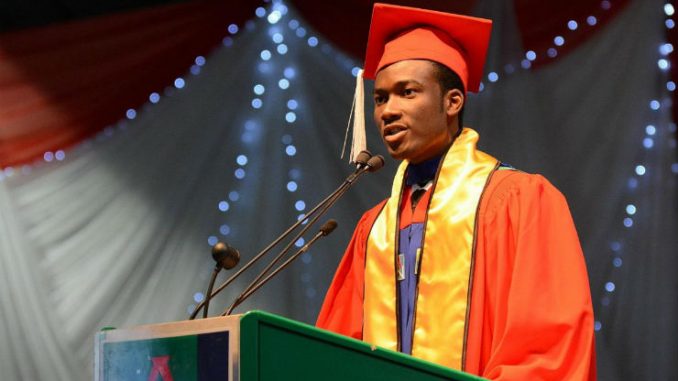
Benedict delivering the valedictorian speech at the commencement ceremony inside the expansive Commencement hall of the American University of Nigeria in Yola, the smile on the face of Benedict Egwuchukwu (Snr), an engineer from Imo State, was so wide it […]
Inside the expansive Commencement hall of the American University of Nigeria in Yola, the smile on the face of Benedict Egwuchukwu (Snr), an engineer from Imo State, was so wide it infected his wife.
They both beamed with smiles – and then burst into laughter – when Mr Egwuchukwu attempted to explain how their son, Benedict (Jnr), the best graduating student in the university’s Class of 2018, acquired his brilliance.
The valedictorian’s mother, Bridget, graduated from the Rivers State University of Science and Technology in 1987 with a First Class degree in Biochemistry; the next placed student after her bagged a Second Class Lower. It took one decade for another First Class student to emerge from that department.
“My son took after his mother but without much dilution,” said Mr Egwuchukwu, a petroleum engineer.
“If there was much dilution he wouldn’t have gotten that (the valedictorian), it was because I had a superior addition to her gene so we made it a super.”
The couple burst into laughter again.
A few metres away, Benedict, clutched one of his five awards on the night and shook hands with Atiku Abubakar, a former vice president of Nigeria and founder of the university; the cameras clicked away.
An Accounting major, he topped the Class of 2018 with a Cumulative Grade Point Average (CGPA) of 3.90 (on a 4.0 scale).
Last year, Immaculata Onuigbo, from Enugu State, scored the highest ever score in the university’s history – 3.98 – to emerge the class valedictorian.
Unlike Ms Onuigbo who began bagging academic scholarships in primary school, Benedict wasn’t always a brilliant student.
His mother said her son “wasn’t very bright in his primary and secondary school” days.
“He wasn’t even first 10, but I wasn’t also bright in my primary and secondary. And I told all of them (her children) ‘It doesn’t matter. All I need you to do is to do your best. Just put in your best, that is all I want from you. When the time is right it will mature.’
“The same thing happened to me, I wasn’t too good in primary school. In my secondary school, I was above average, and in my university, I had first class.”
Benedict said he was surprised to emerge the university’s valedictorian for 2018.
“To be honest, it’s quite overwhelming I didn’t want to believe it at first but here I am,” he said after it was announced last Friday night.
“All I can just say is that I thank God because looking back at my academic history from primary and secondary schools I will not believe I will be here today, I just give God the glory, it’s really overwhelming for me.
“In primary school I was a bit average, in secondary school I really didn’t take my academics too serious until in my SS (Senior Secondary) One, third term, that was when I finally got up to average, and from then on I started picking up on my academics but I still consider myself as an average student back then.”
In addition to receiving the award for Academic Distinction as the best graduating student in Accounting, Benedict also bagged the awards for the best graduating student in the School of Business and Entrepreneurship; VPAA & Provost’s Award for Academic Excellence; Haruna Musa (Individual) Award for Academic Excellence; and the Afrinvest (West Africa) Award for Academic Excellence (which includes a paid internship at any Afrinvest subsidiary).
Out of the 158 students who received their graduate and masters degrees and post-graduate diplomas at the university, 26 were honoured for their academic excellence.
While delivering the valedictorian speech on Saturday, Benedict said he was frightened after receiving an email a fortnight ago informing him he had been shortlisted among the best graduating students.
Benedict arrived at AUN in 2014 after a failed attempt to study in Canada.
His mother said he found it difficult to adapt to the weather in the North American country.
“We had to bring him back,” she said.
“I looked around the country, I wanted something that is as close as possible to what is outside the country and AUN, for me, was it. I spoke to the president (of the university) one-on-one and she assured me that security is paramount to them here.”
In his second year at the university, Benedict said he decided to shake off the ‘Bookworm’ tag that was beginning to be associated with him.
He said he wished he had begun his participation in extra-curricular activities much earlier than he did.
“If I was to start all over again what I would have done differently is that I would have loved to have engaged in more activities from the beginning because in as much as academics is important, relationship with people and communication is very important,” he said.
“I wish I had started earlier, that’s one thing I believe I should have done better.”
Despite starting extra-curricular activities late, Benedict went on to become the Assistant Director of Finance in the Student Government Association, Vice President of the Non-denominational Christian Fellowship, and member of the AUN Football Association. He was also a member of the AUN Honour Society and graduated as an ambassador of the Emerging Leaders Academy.
Mr Egwuchukwu said even though he wasn’t sure his “boy” would make a First Class based on his previous academic records, he never envisaged it getting to “the extent of collecting uncollectables.”
The trajectory his development took after a few years at the university made him suspect something was brewing in his son.
“Because I remember I used to lead the prayer session in the house, and all of a sudden, one morning instead of me leading the prayer session he took over,” Mr Egwuchukwu said.
“And he did it better than I was doing, in fact, I told him to send me some of the materials he was using to do the prayer session. I was impressed.”
Both parents advised other parents who have kids who struggle in their early academic years to be patient with them.
“As a parent, you should know your child, from his academic records, especially if you are enlightened,” Mrs Egwuchukwu said.
“It’s not about what you read, it’s about what you can do.
“Don’t put down a child, no matter how low, encourage that child. From their results in secondary school, we looked at their strengths and directed them to courses that will help them with what they already have in them.”





Be the first to comment